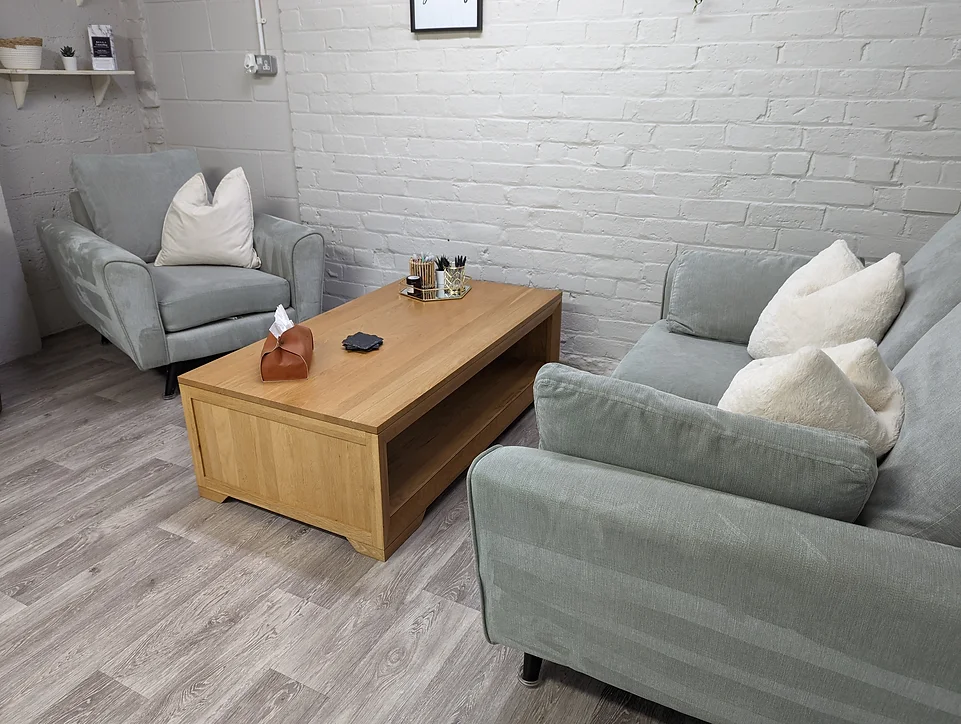Personal Counselling
I offer counselling to adults and young people (aged 16 and over).
Sessions can be by face to face in a quiet and private therapy room located at Stretton, Burton-On-Trent in Staffordshire DE13 0AZ.
I also offer online and telephone counselling.
Sessions are 60 minutes for face to face and 50 minutes for telephone and online counselling.
I offer short interventions (six sessions) and open ended support. At the beginning of counselling we collaborate to set goals which are reviewed in an informal manner every six sessions.
What to Expect?
I will respond to your needs and goals to create an individual plan of treatment. I am open, honest and affirming, meaning I am non-judgmental and do not work through a lens of stereotypes.
My work is informed by a range of different theories and practices. I often employ different methods depending on your issue and goals for therapy.
Click on the boxes below to find out more about how I work.
CHANGING NEGATIVE BEHAVIOURS or THOUGHT PATTERNS
Clients often want help changing negative thoughts and behaviours that are not helping them in their lives and causing negative symptoms such as depression and/or anxiety. If this is the case for you we would work to identify the the triggers, challenge the thoughts and over time make them more positive so they serve you better and stop holding you back.
I use evidence backed interventions for this drawing on Cognitive Behavioural Therapy. In tandem I also regularly use breathing, grounding and meditation tailored to your preferences to calm the nervous system. This holistic approach means both the mind and body are supported to relax making the effects of therapy more effective and embedding change that is long lasting.
WORKING WITH LOSS
This includes but is not exclusive to bereavement. When a person close to you dies grief takes each person on their own twisted and painful path that is different and personal for everyone. It is normal to feel numbness but also emotions such as anger, depression, confusion and thoughts such as ‘what if…..’. We would work on developing supportive practices and in time let emotions flow in a safe way that enables you to begin to process and make sense of your grief. This can be helpful in learning how to not just survive grief but also in time begin to thrive.
Loss can manifest in many ways not just bereavement. The loss of a job, your identity or anything that was important to you can trigger a grieving process. Identifying losses and emotions associated with them can help you start to heal.
LIVING WELL WITH ADHD/AUTISM AND OTHER NEURODOVERGENT RELATED ISSUES
ADHD and Autism are not medical conditions that are ‘caught. All of us are neurodiverse, as no human has the same brain as someone else! However it does seem like some of us seem to run on a slightly different program to others and these people can be classed as neurodivergent. This is very common with estimates of neurodivergence being between 10-20% of the worldwide population.
The advantage of a neurodivergent brain is often intense focus on topics that are of interest to you, empathy and being able to ‘think outside the box’, a skill linked to innovation and creativity. However there are also some downsides of these super powers, there is often is a struggle with any task that requires ‘executive functioning’. This can cause struggles with focus on uninteresting jobs/topics, struggles with organisation and time keeping, bluntness and finding it hard to develop long lasting relationships. Unfortunately these are the areas most required to function in our present society. It can also mean you may struggle with big life events such as leaving home, a new job or becoming a parent.
Anxiety and frustration is caused when it feels like everyone else can do these tasks or take on new roles with ease. Problems with low self-esteem and mental health problems can begin when the anxiety and frustration is compounded and turned inward by self and others criticism through constant comparisons and expectations to just fit into a world that you do not fit the mould of.
The solution is simple I would encourage you to stop judging yourself or loved one by neurotypical standards. After all if you judge a fish by how well it can climb a tree the fish will always feel like a failure. We would work to identify your strengths and support you to develop these. We would work on self-esteem so that you can feel feel more comfortable in yourself without the need to mask and also process the inevitable trauma you will have experienced if you grew up without any additional support.
If it is a family member or friend who you wish to develop a better relationship with, I can help you understand neurodivergence and how it affects how a person may interact and communicate. We can look at ways you can become more neurodivergent affirming, which helps to put neurodivergent people at ease, reducing their anxiety and supporting them to develop good self-esteem.




